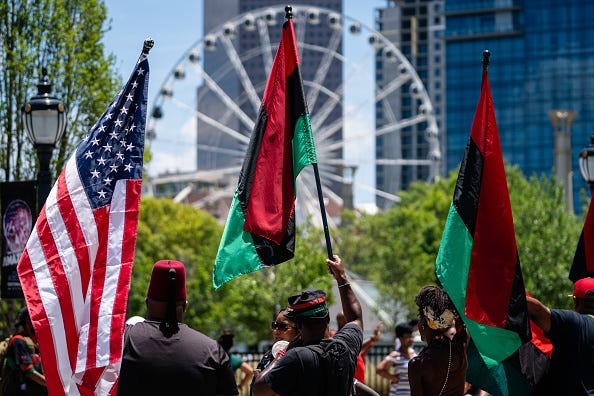
With several companies being criticized in recent weeks for their Juneteenth celebrations and merchandising, the question has risen, are companies going too far by commercializing Juneteenth?
Juneteenth celebrates the day in 1865 when Union troops arrived in Galveston, Texas, announcing the freedom of enslaved people in the state.
While many have begun celebrating the holiday in recent years, thanks to President Biden making it a national holiday in 2021, others have already been celebrating it, Amara Enyia, a policy and research coordinator at Movement for Black Lives, told NBC News.
"For Black folks, there has been a long tradition of commemorating Juneteenth," Enyia said.
But recently, companies like Target, Walmart, and more have been slammed for attempting to profit from the holiday and exploiting its true meaning.
Torrina Harris, a board member of Vision Galveston, a project that sponsors the city's Juneteenth festivities, told NBC News she thinks it's important to ask questions when companies start to get involved in organizing Juneteenth celebrations or creating products to sell.
"Are you actually giving decision-making power that also influences how funds are distributed?" she asks. "Are you giving decision-making power to people who are representative of the community that this holiday is meant to honor?"
She continued pointing out that some companies are completely missing the mark in attempting to celebrate the holiday, pushing racial stereotypes instead.
"Companies that are having these picnics for their employees and feeding them fried chicken and watermelon — who made that call?" Harris said.
Juneteenth merchandise
Retail companies have never been shy about making holiday merchandise, but many have been criticized for profiting off Juneteenth and its long history.
At Kohl's, gray, green, and red shirts that read "Juneteenth 1865" are being sold for $23.99, Reuters reported.
Walmart was in hot water after pictures of its "Juneteenth Ice Cream" went viral online. The Great Value branded ice cream was meant to celebrate "African-American culture, emancipation," according to the caption on the container.
Target was criticized on TikTok for a Minnesota store's display that received complaints about depicting stereotypes of Black people.
But it also goes beyond retail stores, as the Children's Museum of Indianapolis was criticized on its Facebook page for selling watermelon salad in its food court. The museum issued an apology, saying it had chosen the dish based on staff members' family traditions.
But some chains are doing more than others by not keeping profits for their merchandise.
For example, JCPenney is selling numerous wall hangings featuring abstract graphic designs of Black women for the hefty sum of $60 to $160.
Its Chief Merchandising Officer Michelle Wlazlo has shared that the retail chain is donating all net profits from their merchandise to Unity Unlimited, a non-profit that helps communities "overcome racial and cultural division, Reuters reported.
A right way and a wrong way
The vice president and chair of diversity, equity, and inclusion at Empower consultancy, Connie Ross, shared with Reuters that there is a right and wrong way for companies like these to celebrate the holiday.
One recommendation she suggested to the news organization was to promote Black vendors, not create instead of creating their own merchandise.
"Juneteenth was not born out of a pretty story, but give it time, and people are going to find a way to associate it with something positive," Ross said.
Liz Rogers, a Black founder of the ice cream brand Creamalicious, sells her products in Target, Kroger, and Walmart but told Reuters that no one reached out to her for any Juneteenth partnerships.
Biran Packer, the director of media relations and strategy with Golin, shared with Reuters that brands need to find a way to elevate products or services made by people in those communities.
He said it isn't as easy as just "putting a Black Power Fist on something."



